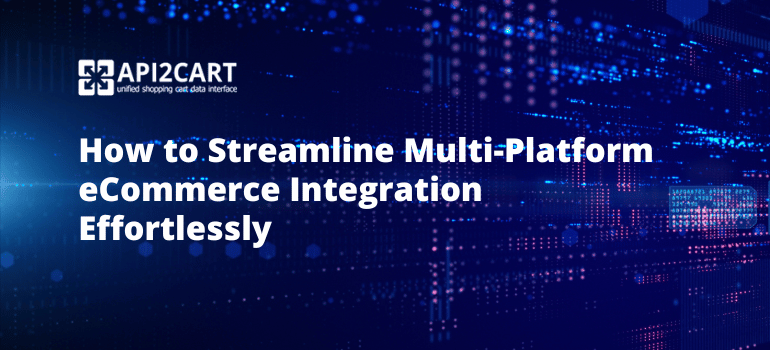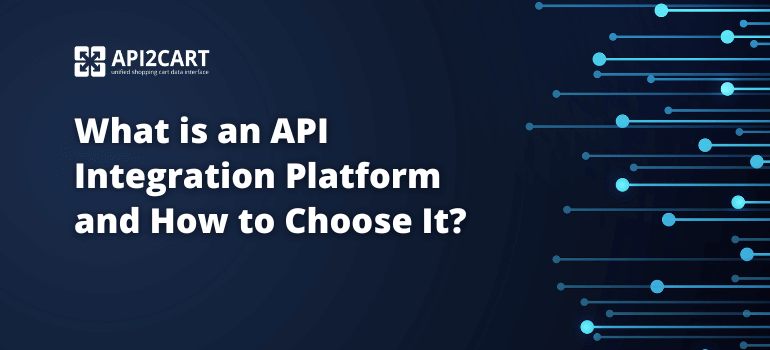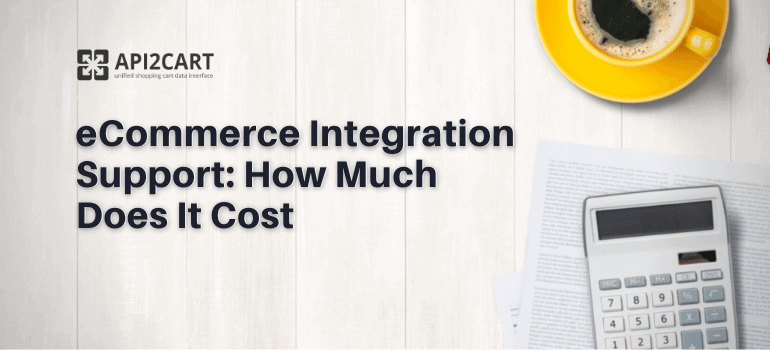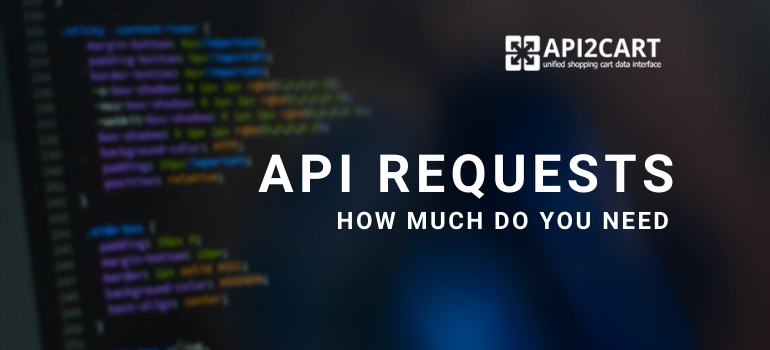
In the fast-paced world of eCommerce, efficiency, and scalability are critical for software providers catering to online retailers. For eCommerce software vendors such as multi-channel management systems, inventory management tools, warehouse management solutions, etc., seamlessly integrating with multiple platforms is not just an advantage but a necessity. Multi-platform integration has become the cornerstone of operational success, allowing vendors to centralize data, improve efficiency, and reduce costs. In this article, we'll explore the challenges of integration, the key benefits of a streamlined approach, and how solutions like API2Cart make Multi-Platform Integration effortless.
What is Multi-Platform Integration?
Multi-platform integration refers to the process of connecting and synchronizing data across multiple eCommerce platforms, marketplaces, and systems through a unified interface. It allows software vendors to streamline operations by consolidating product catalogs, order management, inventory tracking, and customer data from various sources into a single centralized hub. This approach ensures real-time data accuracy across all channels.
Why Multi-Platform Integration Matters
eCommerce software vendors whose solutions have an effective multi-platform integration offers substantial advantages to online store owners:
Centralized Data Management: Access product, order, inventory, and customer data from multiple platforms in one place.
Enhanced Efficiency: Automate data synchronization to reduce manual errors and operational delays.
Scalability: Handle more clients and platforms without adding operational bottlenecks.
However, achieving these benefits requires a reliable, scalable, and user-friendly integration solution.

Which Systems Need Multi-Channel Integration?
Multi-channel integration is essential for various eCommerce-related systems to ensure seamless data flow, accuracy, and efficiency.
Inventory management systems require real-time synchronization of stock levels across different platforms to prevent overselling and stockouts. These systems must process data from multiple marketplaces to keep stock levels accurate and prevent fulfillment delays.
Order management systems centralize order data, track shipments, and ensure timely deliveries across multiple platforms, minimizing errors in manual order handling.
Multi-channel listing tools simplify the process of managing product catalogs, pricing, and promotions across several marketplaces, ensuring consistency in product data and reducing duplication efforts.
Shipping and logistics platforms rely on accurate and synchronized order and customer information to automate processes like shipment labeling, tracking updates, and delivery scheduling. Without integration, these systems risk errors and delays, leading to poor customer experiences.
Customer Relationship Management (CRM) systems consolidate customer interactions, purchase history, and preferences from various channels into a single database. This ensures consistent communication, personalized marketing strategies, and improved customer service.
Lastly, analytics and reporting tools aggregate data from multiple sources to provide actionable insights. Businesses can analyze performance metrics, identify trends, and make data-driven decisions effectively.
Without effective multi-channel integration, these systems operate in silos, causing fragmented data, duplicated tasks, and operational inefficiencies. Integration bridges these gaps, creating a cohesive and scalable ecosystem for managing multi-platform operations.
The Challenges of Multi-Platform Integration
For eCommerce software vendors, integrating with multiple shopping platforms and marketplaces presents several challenges:
Diverse APIs and Protocols: Each platform—whether it's Shopify, WooCommerce, Magento, or Amazon—has its own API architecture, authentication methods, and data structures.
Ongoing Maintenance: APIs are frequently updated, requiring constant monitoring and adjustments to avoid service disruptions.
Resource-Intensive Development: Developing and maintaining integrations for each platform demands substantial time, technical expertise, and financial investment.
Scalability Issues: As client demands grow, managing integrations across multiple platforms can become overwhelming without an efficient system.
These challenges highlight the need for a robust solution that can simplify multi-platform integration while minimizing complexity.
API2Cart: The Ultimate Multi-Platform Integration Solution
API2Cart is a robust integration platform designed specifically for eCommerce software vendors. It provides a unified API to connect with over 40 shopping platforms and marketplaces, including Shopify, Magento, WooCommerce, BigCommerce, Amazon, and eBay.
Key Features of API2Cart for Multi-Platform Integration
Unified API Interface: With API2Cart, developers can connect to multiple platforms using a single API, reducing development time and complexity.
Comprehensive Data Access: Access critical data like product catalogs, order details, customer information, and inventory levels from multiple sources.
Real-Time Synchronization: Keep data updated in real-time across all connected platforms.
Scalable Infrastructure: Handle growing volumes of data and platform connections effortlessly.
Dedicated Technical Support: Receive ongoing assistance to address integration challenges and ensure smooth operations.
API2Cart simplifies the integration process, empowering software vendors to focus on their core functionalities rather than managing complex API connections.
How API2Cart Streamlines Multi-Platform Integration
Step 1: Single Integration Point
With API2Cart, you integrate once and gain access to over 40 platforms such as Magento, WooCommerce, Shopify, Amazon, Etsy, etc. Instead of building separate connections for each system, you can manage all integrations through a single interface.
Step 2: Unified Data Format
API2Cart standardizes data formats across different platforms, eliminating inconsistencies and making data processing much more manageable.
Step 3: Automated Updates
As shopping platforms update their APIs, API2Cart handles these changes, ensuring that your integrations remain functional without requiring constant manual updates.
Step 4: Focus on Core Development
By outsourcing platform-specific API complexities to API2Cart, your development team can focus on improving your core product offering.
The Future of Multi-Platform Integration
As eCommerce ecosystems continue to evolve, the demand for seamless Multi-Platform Integration will only grow. Emerging technologies such as Artificial Intelligence (AI) and Machine Learning (ML) will further enhance integration capabilities by automating data analysis, predicting trends, and improving decision-making processes. Additionally, increased adoption of cloud-based solutions will make integration even more accessible, scalable, and cost-efficient. Software vendors that invest in robust integration solutions like API2Cart will be better positioned to adapt to these changes, delivering exceptional value to their clients and staying ahead of the competition.
Final Thoughts
For eCommerce software vendors, multi-platform Integration is no longer optional—it's essential. API2Cart offers a seamless, scalable, and reliable solution to manage integrations across multiple platforms without the usual headaches. By adopting API2Cart, vendors can focus on building superior products and delivering exceptional value to their clients.
Embrace the power of multi-platform integration with API2Cart and unlock new levels of efficiency, scalability, and profitability for your business.
Stay ahead of the competition by leveraging the power of seamless integration across all your platforms today. Start your integration journey with API2Cart and experience effortless connectivity across leading eCommerce platforms.
FAQs
This eliminates the need to build separate integrations for each platform, simplifying the process and speeding up development. This allows it to avoid developing individual integrations for each platform, making the process less complex and accelerating development.



